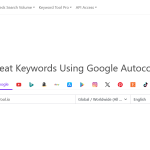Introduction
Keyword research forms the bedrock of successful content creation and search engine optimization (SEO) tactics. Whether you're a blogger, marketer, or website owner, comprehending the difference between transactional and informational keywords holds paramount importance. In this article, we'll dive deep into the realm of keyword research, unraveling the art of identifying and leveraging both transactional and informational keywords to drive traffic and bolster revenue.
Unveiling the Keyword Categories
1. Transactional Keywords: The Key to Conversions
Transactional keywords are the lifeblood of e-commerce and affiliate marketing. They mirror an audience prepared to take action, such as making a purchase or signing up for a service. These keywords are closely tied to specific products or services, and they showcase commercial intent. Here are the vital facets of transactional keywords:
- Intent to Purchase: Users using transactional keywords are actively seeking to fulfill a need, rendering them valuable prospects.
- High Conversion Potential: As these users are nearer to making a purchasing decision, the conversion rate tends to be higher.
- Examples: “best wireless headphones,” “buy electric grill online,” “cheap flight deals.”
2. Informational Keywords: Dispensing Value and Establishing Authority
Informational keywords, in contrast, cater to users on the hunt for answers, guidance, or knowledge. These keywords signal that users seek information rather than an immediate purchase. Here's what you should grasp about informational keywords:
- Educational Intent: Users employing informational keywords desire to learn more about a specific topic, without an immediate buying intent.
- Building Trust: By crafting high-quality content around informational keywords, you can cement your authority in a specific niche.
- Examples: “how to lose weight,” “benefits of meditation,” “history of ancient civilizations.”
The Potency of Transactional Keywords
Transactional keywords serve as your gateway to monetization. Here's how to skillfully harness their potential:
1. Identifying Transactional Keywords
To spot transactional keywords, concentrate on products, services, or solutions your target audience actively seeks. Employ keyword research tools like Ahrefs, SEMrush, or Google Keyword Planner to identify keywords with these attributes:
- High search volume
- Clear commercial intent
- Product-specific queries (e.g., “best smartphones under $500”)
2. Crafting High-Converting Content
When shaping content around transactional keywords, aim to directly address the user's intent. Consider these strategies:
- Product Reviews and Comparisons: Create comprehensive reviews and comparisons of various products or services in your niche.
- Buyer's Guides: Develop comprehensive guides aiding users in making informed purchase decisions by presenting pros, cons, and recommendations.
- Tutorials and How-Tos: Generate tutorials demonstrating effective product use or the accomplishment of specific tasks.
3. Monetizing Through Affiliate Marketing
Leverage affiliate marketing by integrating affiliate links into your transactional content. When users make purchases via your affiliate links, you earn a commission. Optimize your affiliate strategy with these steps:
- Choose reputable affiliate programs aligning with your niche and audience.
- Transparently disclose your affiliate relationships to foster trust with your readers.
- Employ tracking tools to monitor your affiliate links' performance and make data-driven enhancements.
The Influence of Informational Keywords
Informational keywords empower you to provide value to your audience and solidify your expertise within a niche. Here's how to maximize the potential of informational keywords:
1. Identifying Informational Keywords
To unearth informational keywords, ponder the questions your target audience might pose regarding your niche. Utilize tools like Ahrefs, Google Trends, and Answer the Public to pinpoint trending topics and queries.
2. Crafting Authoritative Content
When fashioning content around informational keywords, focus on delivering thorough, accurate, and captivating information. Consider these content formats:
- Guides and How-Tos: Produce comprehensive guides aiding users in tasks or learning about specific subjects.
- Explainers and Tutorials: Create videos, infographics, or step-by-step articles to simplify intricate concepts.
- Lists and Roundups: Curate compilations of valuable resources, tools, or tips in your niche.
3. Establishing Authority and Engagement
Quality informational content helps you establish authority and interact with your audience:
- Employ clear headings, bullet points, and visuals to enhance content scannability and ease of comprehension.
- Foster interaction through comments, social media, or email subscriptions to cultivate a loyal community.
- Showcase your expertise by citing reputable sources, sharing personal experiences, and offering distinctive insights.
Utilizing Free Tools for Keyword Research
While premium tools like Ahrefs offer an array of features, you can still glean valuable insights from free alternatives:
1. Google Trends
Google Trends uncovers emerging and popular keywords, providing insights into present trends. Simply input keywords or topics to observe their search trends over time.
2. Answer the Public
Answer the Public generates a visual depiction of questions and phrases people employ while searching for a specific keyword. This tool aids in comprehending user intent and crafting content that addresses their queries.
3. Google Suggest
As you type into Google's search bar, autocomplete suggestions supply real-time keyword ideas, granting insight into active user searches.
Striking the Balance: Transactional vs. Informational Content
For a well-rounded content strategy, strike equilibrium between transactional and informational content:
- Devote roughly 75% of your efforts to crafting valuable informational content, fostering your brand and authority.
- Allocate the remaining 25% to transactional content, spurring conversions and monetization.
- Regularly analyze content performance, adapting your strategy based on user engagement and conversion rates.
Conclusion
Keyword research underpins triumphant content creation and SEO endeavors. By grasping the distinction between transactional and informational keywords, you can tailor your content strategy to provide value, drive traffic, and generate revenue. Harnessing tools like Ahrefs, Google Trends, and Answer the Public aids in uncovering precious keyword insights. Remember, a balanced approach that merges educational and commercial content paves the way for a comprehensive and efficacious content marketing strategy.








